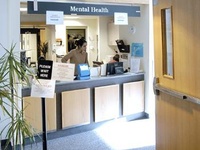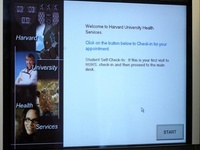Rosenthal, the public health professor, says that using nurse practitioners is a good way to cut costs—so long as they work in conjunction with doctors.
“Nurse practitioners don’t stand alone. They are part of a medical group where the doctor is effectively behind them,” Rosenthal says. “They are really cost effective, and they listen better than anyone.”
But some students say few UHS prescribing psychiatrists and nurse practitioners are listening—they’re just doling out medication.
After a year of agonizing over concentrations and work, one female 2003 graduate saw a UHS clinician to deal with her anxiety disorder.
“I saw a guy whose whole job was to prescribe drugs to children. He wasn’t a therapist, but he was the only guy I could see within three days,” she says. “His immediate response was to put me on medication.”
Kadison says UHS prescribes medication to around a third of the students it sees. Students should not go longer than two months on medication without seeing a clinician, he says.
This may be the general guideline, but Quinn says the practice of it is far from perfect.
“Drugs are prescribed [at UHS] without patients being in talk therapy or a suggestion of restructuring the way they live life,” Quinn says. “No matter how great a drug is, if you go home to a place with no one to talk to, you’re not going to be better.”
Triage
When students initially call UHS for an appointment, they are given a triage interview by phone, in which clinicians determine who the student should first see—a prescribing clinician or one focused on therapy, Kadison says.
Kadison says UHS began this system one and half years ago in order to get students on a fast track to care as soon as they express interest in getting help. While previously a student would have to wait for an hour-long appointment slot before their first contact with a UHS clinician, now a student receives this 20-minute triage appointment usually within a day of making their original call.
Kadison says that the “most experienced clinicians” do triage. But it is luck of the draw whether a student has that first triage appointment with a psychologist, psychiatrist or nurse practitioner.
Dr. Clarice J. Kestenbaum, a professor of clinical psychiatry at Columbia and a former president of the American Academy of Child and Adolescent Psychiatry, says that the decreased wait time is not worth it if the student sees the wrong person.
Kestenbaum says that only clinicians with expertise in both therapy and medication should be able to do the first evaluation—which she says is critical to getting a student on the right recovery path.
“The person is getting short-changed,” she says. “The question is, is the patient seeing the doctor they need?”
Read more in News
Chapel May Remain in Cambridge Permanently














